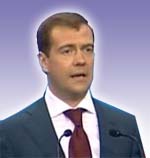Medvedev's new security plans
 Brussels - Russian President Dmitry Medvedev's plans for a Europe-wide security pact look set to be Russia's priority at the European Union-Russia summit in the French resort of Nice on Friday.
Brussels - Russian President Dmitry Medvedev's plans for a Europe-wide security pact look set to be Russia's priority at the European Union-Russia summit in the French resort of Nice on Friday.
Medvedev first spoke of his desire to create a "treaty on the basic principles for security and intergovernmental relations in the Euro-Atlantic region" in a speech in Berlin on June 5. He added details in a speech in the French spa town of Evian on October 8.
Specifically, he named five principles for an international deal between European states, Canada and the United States to replace the Helsinki Final Accords of 1975, which laid the basis for peaceful relations between the Soviet Union and the West.
First, it should make respect for principles such as sovereignty, territorial integrity and national independence legally binding.
Second, it should affirm "the inadmissibility of the use of force or the threat of its use in international relations," calling for negotiated settlements to solve disputes.
Third, it would outlaw "ensuring one's own security at the expense of others ... acts by military alliances and coalitions that undermine the unity of the common security space ... (and) development of military alliances that would threaten the security to other parties of the treaty."
Fourth, the treaty would guarantee that "no state or international organization can have exclusive rights to maintaining peace and stability in Europe."
Finally, it would establish "basic arms-control parameters and reasonable limits on military construction," together with new procedures to fight the drug trade, nuclear proliferation and terrorism.
Analysts say that the first two principles effectively reproduce the rules laid down in Helsinki, but that they omit a key clause on respecting human rights.
They also point out that Russia breached both principles in its August war with Georgia, since it used force to violate the latter's territorial integrity and sovereignty.
The third principle is widely seen as an attempt to block US plans for a missile-defence system in Europe (which Russia sees as threatening its own security) and to block NATO's expansion into the former-Soviet space.
The fourth principle is seen as a veiled dig at NATO and the European Union, both of which already cover most of Europe and are set to expand further, while the fifth one attempts to harmonize existing diplomatic initiatives in a number of key areas.
French President Nicolas Sarkozy, current holder of the EU's rotating presidency, said that Medvedev's idea was worth discussing, and suggested that the Organization for Security and Cooperation in Europe (OSCE) should debate it in the autumn of 2009. (dpa)